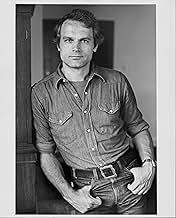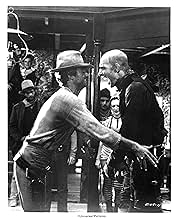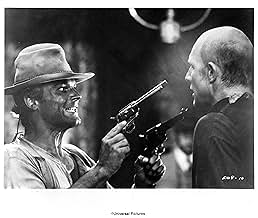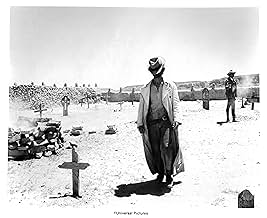IMDb-BEWERTUNG
7,3/10
31.181
IHRE BEWERTUNG
Ein junger Revolverheld (Hill) verehrt den alternden Revolverhelden (Fonda), der einfach nur in Rente gehen will.Ein junger Revolverheld (Hill) verehrt den alternden Revolverhelden (Fonda), der einfach nur in Rente gehen will.Ein junger Revolverheld (Hill) verehrt den alternden Revolverhelden (Fonda), der einfach nur in Rente gehen will.
- Auszeichnungen
- 1 wins total
R.G. Armstrong
- Honest John
- (as R.K. Armstrong)
Marc Mazza
- Don John
- (as Mark Mazza)
Rainer Peets
- Big Gun
- (as Remus Peets)
Antoine Saint-John
- Scape
- (as Antoine Saint John)
Empfohlene Bewertungen
This spaghetti-in-cheek western from Sergio Leone and crew (direction credit went to Leone protégé Tonino Valerii) opens with déjà vu. Haven't we seen Henry Fonda getting shaved before, wondering if the barber's going to slit his throat?
Referencing his own "Once Upon a Time in the West" of five years earlier, idea-man Leone also pays satirical homage to perhaps the bloodiest western in history by inserting "the wild bunch" into this film as a band of one hundred, fifty men who appear only and repeatedly as a thundering herd in Leone-signature panoramas, accompanied by another impressive Ennio Morricone score, a herd which would-be greatest gunslinger, Nobody, proposes that Fonda's character face single-handedly to get him into the history books before Nobody draws him down. (Making the reference explicit, Nobody reads "Sam Peckinpah" off a grave marker in the scene leading to the first appearance here of "the wild bunch.")
As derivative as this movie may be, it's still enjoyable for its performances, its photography, its score, its style, its "twist" ending, its speed-up scenes which give Nobody's antics a silent Chaplin hearkening, and its one-off take on the spaghetti western which Leone made popular.
Referencing his own "Once Upon a Time in the West" of five years earlier, idea-man Leone also pays satirical homage to perhaps the bloodiest western in history by inserting "the wild bunch" into this film as a band of one hundred, fifty men who appear only and repeatedly as a thundering herd in Leone-signature panoramas, accompanied by another impressive Ennio Morricone score, a herd which would-be greatest gunslinger, Nobody, proposes that Fonda's character face single-handedly to get him into the history books before Nobody draws him down. (Making the reference explicit, Nobody reads "Sam Peckinpah" off a grave marker in the scene leading to the first appearance here of "the wild bunch.")
As derivative as this movie may be, it's still enjoyable for its performances, its photography, its score, its style, its "twist" ending, its speed-up scenes which give Nobody's antics a silent Chaplin hearkening, and its one-off take on the spaghetti western which Leone made popular.
All that gunslinger Jack Beauregard (Henry Fonda) wants to do is retire while he's still alive. But Nobody (Terence Hill) wants to see Beauregard go out in blaze of glory. Nobody dogs him across the West insisting that if Beauregard will just face one more enemy, he's sure to go down in the annals of history. But Nobody's idea is for Beauregard to have it out with the 150 man strong Wild Bunch - all alone.
The shortest and most to the point description that I can come up with for this movie is "Sergio Leone Meets the Three Stooges". On the one hand, you've got Henry Fonda in the traditional Western role (albeit Spaghetti Western). On the other hand, you've got Terence Hill performing some of the best slapstick and pantomime since the era of the silent film. It sounds like an unlikely combination, but Valerii successfully marries the two styles into a very enjoyable experience. The scenes with Fonda and Hill together are as good as you'll see in a Spaghetti Western.
While some of Hill's comedy seems goofy and doesn't work that well, most of it is very funny. There are moments of pure genius. The shooting scene in the saloon is a particular favorite of mine.
Morricone's score is amazing. He draws inspiration from and pays homage to some of the earlier scores he did. I was reminded several times of Once Upon a Time in the West, the Dollars Trilogy, and other Spaghetti Westerns. Writing positive comments on a Morricone score is becoming a bit redundant. Did he ever write a score that you could call bad?
For those of us who have only seen My Name is Nobody on VHS with bad transfers and missing footage, the new Image DVD is a real treat. It was a lot like watching the movie for the first time. I never thought this movie could look so good. My only complaint is the lack of extras. The disc doesn't even have a trailer.
The shortest and most to the point description that I can come up with for this movie is "Sergio Leone Meets the Three Stooges". On the one hand, you've got Henry Fonda in the traditional Western role (albeit Spaghetti Western). On the other hand, you've got Terence Hill performing some of the best slapstick and pantomime since the era of the silent film. It sounds like an unlikely combination, but Valerii successfully marries the two styles into a very enjoyable experience. The scenes with Fonda and Hill together are as good as you'll see in a Spaghetti Western.
While some of Hill's comedy seems goofy and doesn't work that well, most of it is very funny. There are moments of pure genius. The shooting scene in the saloon is a particular favorite of mine.
Morricone's score is amazing. He draws inspiration from and pays homage to some of the earlier scores he did. I was reminded several times of Once Upon a Time in the West, the Dollars Trilogy, and other Spaghetti Westerns. Writing positive comments on a Morricone score is becoming a bit redundant. Did he ever write a score that you could call bad?
For those of us who have only seen My Name is Nobody on VHS with bad transfers and missing footage, the new Image DVD is a real treat. It was a lot like watching the movie for the first time. I never thought this movie could look so good. My only complaint is the lack of extras. The disc doesn't even have a trailer.
The title "My name is Nobody" was, I think, taken from a text in Homer's Odyssey which Odysseus said to Cyclops, the one-eyed giant. And, indeed, if one considers that fact one could better see what this film's message is: While old Jack Beauregard could, after a long voyage, at last go home to Europe, "Nobody" was destined to continue his odyssey far from home in countries that were never his cultural homeland.
Albeit the film itself is a parody of other westerns, of 'C'era una volta il West' and/or 'The wild bunch' for example, and therefore should be (and is in fact) comical and funny, one nevertheless hears a slightly melancholy song sung by/about Odysseus(= Nobody) who had forgotten his homeland. Owing to that (please let me dare say)'depth', 'Il mio nome e nessuno' succeeded in being far more than a simple parody and in appealing not only to 'genre fans' but also to 'general' movie lovers: Fonda's brilliant performance, Fonda and Terence Hill's unique combination, Morricone's perfect score. It's all really tasty.
I still remember that a Japanese film critic at that time has rated this film low, because 'it was a spaghetti western made by an assistant of Sergio Leone'. But when I myself saw the film later, I (please excuse me for being cheeky and cocky) doubted his eye of a film critic: Why hasn't he seen that this film clearly stood out from other Italian westerns? Why has he ignored the fact that Tonino Valerii could make excellent westerns without Leone and without Morricone? (I of course mean 'Il prezzo del potere' and 'I giorni dell'ira'.)
Albeit the film itself is a parody of other westerns, of 'C'era una volta il West' and/or 'The wild bunch' for example, and therefore should be (and is in fact) comical and funny, one nevertheless hears a slightly melancholy song sung by/about Odysseus(= Nobody) who had forgotten his homeland. Owing to that (please let me dare say)'depth', 'Il mio nome e nessuno' succeeded in being far more than a simple parody and in appealing not only to 'genre fans' but also to 'general' movie lovers: Fonda's brilliant performance, Fonda and Terence Hill's unique combination, Morricone's perfect score. It's all really tasty.
I still remember that a Japanese film critic at that time has rated this film low, because 'it was a spaghetti western made by an assistant of Sergio Leone'. But when I myself saw the film later, I (please excuse me for being cheeky and cocky) doubted his eye of a film critic: Why hasn't he seen that this film clearly stood out from other Italian westerns? Why has he ignored the fact that Tonino Valerii could make excellent westerns without Leone and without Morricone? (I of course mean 'Il prezzo del potere' and 'I giorni dell'ira'.)
My Name is Nobody is in a way a very odd kind of western. It mixes seriousness reminiscent of previous spaghetti westerns with slapstick humor which is reminiscent of the silent era ( Also includes a lot of fast forwarding low framerate which is what all the camera's consisted of in those days ), and the end result is surprisingly stunning and charming at the same time.
Terence Hill plays the comical over confident superhumanly quick apprentice like no other, with the bar glass-shooting scene being an absolute high for his character. The acting inside the acting going on in this particular scene is fantastic, and Hill's mannerisms succeed in making this silent era-like slapstick humor succeed. Fonda represents the more serious half of the film which focuses more on scale and paying homage to past classics, primarily Once Upon a Time in the West which is also starring Henry Fonda. Some obvious examples are Morricone's identical near copy of Harmonica's theme in a couple of scenes involving Fonda in My Name is Nobody, or an intro that features three gunman silently observing and pacing around a certain area only to get blown away. His character is quite similar to the one he plays in Once Upon a Time in the West, except for the fact that his morality seems to lean a lot more towards 'Good' in this one. With Fonda's usual intensity he captures the serious half of the film extremely well and delivers a great performance.
Except for the slapstick humor this mostly truly feels like a serious film, because the depth and symbolisms in the film are all there. The story that Hill mentions about the bird, cow & coyote are an obvious example of this. Everything seems to be a metaphor for something else, and the depth in this screenplay is truly impeccable. This in turn makes this motion picture more than just a comic escapism flick. It is an in-depth examination of the death of the west and covers this up well in a comedy homage/parody kind of setting on all the films that made westerns so great. ( Especially spaghetti westerns ) There are not just references to Once Upon a Time in the West since there is also a scene for example in which main characters exchange shots on eachothers hats which is an homage of For a Few Dollars More (1965)
The cinematography is superb with a varied color palette and stunning mixes of close-ups and widescreen shots much in the same manner as the legendary Sergio Leone ( Who also produced this film ). The shots of the Wild Bunch ( Another homage to another western ) riding in the distance while slowly moving closer to the camera while Morricone's odd but brilliant 'The Wild Horde' plays is just cinematic perfection. The greatest use of this is obviously the one in which Jack ( Henry Fonda ) faces the Wild Bunch alone while the camera slowly pans back and upwards. It is such a majestic and elegant way of visual storytelling because the further back the camera pans the more you get the sense of the enormous scale of the numbers of the Wild Bunch, making them more intimidating and heightening Beauregard's feat if he truly manages to defeat them on his own.
My Name is Nobody is a weird mix of comedy & metaphor filled seriousness, but it succeeds like no other because it tells a genuinely humane message about progress and the dying of an old world ( Which is ofcourse the west ) through subtle metaphors & symbolisms. It truly feels like the closing chapter of a fantastic era.
Terence Hill plays the comical over confident superhumanly quick apprentice like no other, with the bar glass-shooting scene being an absolute high for his character. The acting inside the acting going on in this particular scene is fantastic, and Hill's mannerisms succeed in making this silent era-like slapstick humor succeed. Fonda represents the more serious half of the film which focuses more on scale and paying homage to past classics, primarily Once Upon a Time in the West which is also starring Henry Fonda. Some obvious examples are Morricone's identical near copy of Harmonica's theme in a couple of scenes involving Fonda in My Name is Nobody, or an intro that features three gunman silently observing and pacing around a certain area only to get blown away. His character is quite similar to the one he plays in Once Upon a Time in the West, except for the fact that his morality seems to lean a lot more towards 'Good' in this one. With Fonda's usual intensity he captures the serious half of the film extremely well and delivers a great performance.
Except for the slapstick humor this mostly truly feels like a serious film, because the depth and symbolisms in the film are all there. The story that Hill mentions about the bird, cow & coyote are an obvious example of this. Everything seems to be a metaphor for something else, and the depth in this screenplay is truly impeccable. This in turn makes this motion picture more than just a comic escapism flick. It is an in-depth examination of the death of the west and covers this up well in a comedy homage/parody kind of setting on all the films that made westerns so great. ( Especially spaghetti westerns ) There are not just references to Once Upon a Time in the West since there is also a scene for example in which main characters exchange shots on eachothers hats which is an homage of For a Few Dollars More (1965)
The cinematography is superb with a varied color palette and stunning mixes of close-ups and widescreen shots much in the same manner as the legendary Sergio Leone ( Who also produced this film ). The shots of the Wild Bunch ( Another homage to another western ) riding in the distance while slowly moving closer to the camera while Morricone's odd but brilliant 'The Wild Horde' plays is just cinematic perfection. The greatest use of this is obviously the one in which Jack ( Henry Fonda ) faces the Wild Bunch alone while the camera slowly pans back and upwards. It is such a majestic and elegant way of visual storytelling because the further back the camera pans the more you get the sense of the enormous scale of the numbers of the Wild Bunch, making them more intimidating and heightening Beauregard's feat if he truly manages to defeat them on his own.
My Name is Nobody is a weird mix of comedy & metaphor filled seriousness, but it succeeds like no other because it tells a genuinely humane message about progress and the dying of an old world ( Which is ofcourse the west ) through subtle metaphors & symbolisms. It truly feels like the closing chapter of a fantastic era.
10AriSquad
This is a great Tonino Valerii & Sergio Leone film featuring Henry Fonda & Terence Hill. This is a take on the Trinity character Hill has done in the past, not the same character but a variation of it. This movie is a lot more serious than the Trinity(s) but still provides some very very funny scenes & plenty of them. The more serious side is a great story, a man (Fonda) who is a living legend, especially in the eyes of a stranger (Hill) who will do everything he can to see his hero get written in the history books. It is adventurous, touching, and hysterical. All the elements of a perfect film for me. Also features an amazing soundtrack by none other than Ennio Morricone. Both the film & its score are gems. Worth watching over & over. A true 10!
Wusstest du schon
- WissenswertesWhile walking through Boot Hill, Nobody points out to Beauregard that one of the names on a gravestone is Sam Peckinpah. That same year, Clint Eastwood, in Ein Fremder ohne Namen (1973), had a Boot Hill scene that included Sergio Leone's tombstone, as well as a number of others.
- PatzerAs Nobody and Jack face off in the New Orleans street,a window air-conditioner (draped with canvas) and what looks like an electric window fan can be seen on the side of the "Hotel" in the background.
- Zitate
Jack Beauregard: Folks that throw dirt on you aren't always trying to hurt you, and folks that pull you out of a jam aren't always trying to help you. But the main point is when you're up to your nose in shit, keep your mouth shut.
- Alternative VersionenThe initial US home video release through KVC Home Video used the original Titanus (Italian) print with the English dialog track used for the US theatre release. This meant that although the dialog was in English, the main title and all credits were in Italian.
- VerbindungenEdited into Time Breaker (1975)
- SoundtracksIl Mio Nome E' Nessuno (My Name Is Nobody) (Main Title)
Written and Performed by Ennio Morricone And His Orchestra
Top-Auswahl
Melde dich zum Bewerten an und greife auf die Watchlist für personalisierte Empfehlungen zu.
- How long is My Name Is Nobody?Powered by Alexa
Details
- Erscheinungsdatum
- Herkunftsländer
- Sprache
- Auch bekannt als
- Il mio nome è Nessuno
- Drehorte
- Produktionsfirmen
- Weitere beteiligte Unternehmen bei IMDbPro anzeigen
Box Office
- Budget
- 8.000.000 DM (geschätzt)
Zu dieser Seite beitragen
Bearbeitung vorschlagen oder fehlenden Inhalt hinzufügen
































